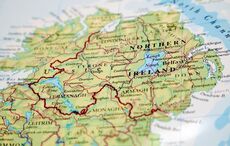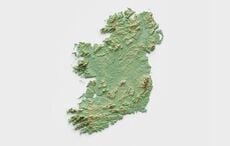Currently, only Irish citizens who are "ordinarily resident in Ireland" may vote in Ireland's Presidential elections, though efforts have been underway for some time to address the issue.
“As a young Irish person living in Ulster, I think it is only fair that everyone on this island has a say in who represents them in the Áras an Uachtarán," Cian Bambrick, Ógra Fianna Fáíl's Ulster Organiser who has been leading the group's efforts, told IrishCentral on Tuesday.
“Internationally, most people don't make the distinction between people living north or south of the border. Why can we not have someone that represents everyone on this island as a whole?”
Bambrick noted the support of fellow Ogra members, as well as that of Fianna Fáíl Senator for Donegal Niall Blaney.
Northern Ireland's Social Democratic and Labour Party (SDLP) also expressed its support for the proposal on Monday, the Belfast Telegraph reports.
“We are fully committed to bringing this change about,” Bambrick said.
Senator Blaney said on Monday that unionists should not fear the proposal, but rather view it as "an invite to embrace and involve themselves on such matters on a shared Island basis in a manner which in no way affects their constitutional status on this Island as enshrined in the Good Friday Agreement.
“I would hope that this is seen as an offer to build a shared future and one which leaves nobody behind, whatever their identity."
Fianna Fáil TD for Cavan-Monaghan Brendan Smith said on Monday said that extending the franchise for future Irish Presidential elections "is a small but meaningful acknowledgment of the need to be inclusive of both traditions, and none, on this island in constitutional change in the future.
"I welcome this initiative by Ógra and at all levels in politics we need to work ceaselessly and positively to derive maximum benefits from the Good Friday Agreement for people throughout all of Ireland."
? Amazing to see the support for @OgraFiannaFail's proposal calling for Irish presidential voting rights to be extended to the North. ??@BrendanSmithTD | @ErinMcGreehan | @niall_blaney | @JustinMcNu1ty pic.twitter.com/LEYeR8kqY5
— Cavan Ógra Fianna Fáil (@CavanOgra) September 26, 2022
Fianna Fáil Senator for Louth Erin McGreehan was also on hand on Monday, and said afterward that it is "important that this happens."
It’s important that this happens. Our President is a president for all the island and they should be elected by all citizens on the island…. https://t.co/d4mdg1bBXd
— Senator Erin McGreehan (@ErinMcGreehan) September 27, 2022
Fianna Fáil Councillor for Monaghan Aoife McCooey also signaled her support:
I joined my Fianna Fáil colleagues and SDLP Friends today in support of an Ógra Fianna Fáil proposal to extend Presidential voting rights across the island of Ireland. ?? pic.twitter.com/Dsxl4ZBpgz
— Cllr Aoife McCooey (@aoifemccooeyff) September 26, 2022
Voting in Irish elections from abroad
Unlike people in other countries, Irish citizens who are no longer living in the Republic of Ireland cannot cast votes in Irish elections from abroad.
"Subject to a limited number of exceptions, Irish citizens resident outside the State do not have the right to vote at elections or at referendums held in the State," Ireland's Department of Foreign Affairs says.
This is in relation to Ireland’s Electoral Act of 1992, which dictates that Irish citizens who have left Ireland for no longer than 18 months are still entitled to vote. Thus, Irish citizens living abroad for more than 18 months are not permitted to vote in Irish elections.
There are exceptions for Ireland's Defence Forces personnel and civil servants (and their spouses / civil partners) who are members of missions and who, for the time being, are serving outside the State because of the requirements of their duties.
A 2013 report from the Irish Convention on the Constitution, however, recommended that Irish citizens resident outside of Ireland should have the right to vote in Irish presidential elections.
As such, the Irish government intended to host a referendum on whether or not Irish citizens abroad could vote in Irish presidential elections. The referendum was planned for 2019, but it was ultimately delayed largely due to Brexit, and later, Covid.
While a new date for the referendum has yet to be confirmed, the matter is still of importance to the Irish government. In its Diaspora Strategy 2020 - 2025, the Irish government says it aims for “greater engagement of our citizens outside the State in our democracy will strengthen the connection between the diaspora and Ireland.
“Diaspora participation in presidential elections will strengthen the connection between the Presidency, the highest office in the State, and the diaspora.”
To facilitate this engagement, the Irish government plans to “hold a referendum on extending the franchise in presidential elections to citizens resident outside the State.”
In April 2020, Billy Lawless, then Ireland's Minister for the Diaspora, penned a letter to the Taoiseach urging the referendum to go ahead in 2021.
“We can’t have a Republic with two types of citizens – a first class with the right to vote, and a second class with no rights at all," Lawless wrote, adding that Ireland’s electoral system “now denies the vote to well over a third of all Irish citizens.”
Last year, IrishCentral asked its readers whether or not Irish citizens abroad should be able to vote in elections. Nearly 70% of respondents said that yes, Irish citizens should be able to vote from abroad.
In April of this year, Ireland's Minister for the Diaspora Colm Brophy said that a referendum on voting rights would happen before 2024.
The next Presidential election in Ireland is scheduled for 2025.




Comments